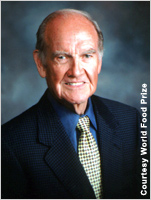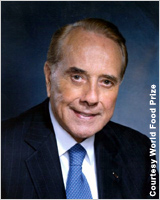AMERICAN GIVING | Strengthening communities through generosity
17 October 2008
McGovern, Dole Honored for Feeding the Hungry
World Food Prize recognizes bipartisan anti-hunger efforts

Des Moines, Iowa — When retired Democratic Senator George McGovern was growing up during the 1930s in a small town in South Dakota situated along railroad tracks, he saw hungry people.
Young men traveling the freight trains to the western part of the United States would stop and ask local residents for small jobs. In return for completing a job, they received a meal. McGovern’s parents tried to offer a meal to any poor person who came by.
Later, as a young military service member during World War II, McGovern saw hungry children in Italy. He saw young mothers scramble for scraps of food and sometimes resort to prostitution to get money to feed their families.
He vowed then that, if he ever got into a position to work against hunger, he would.
McGovern’s first major role came when he was asked to run the U.S. Food for Peace Program during the John F. Kennedy administration. He proposed to Kennedy at the time that the United States should initiate an international food aid program, and his idea grew to become the United Nations World Food Programme, first established in 1961–1962.
When retired Republican Senator Bob Dole was young, he served in World War II. Afterward, he worked as a county attorney in his home state of Kansas. He remembers signing papers during difficult financial years to give his own grandparents government assistance.
He thought then that Americans have “a responsibility” to come to the assistance of all people who need it.
McGovern and Dole, both of whom have gained their parties’ nominations for president in the past, have worked together on anti-hunger efforts since the early 1970s.

They were honored October 16, World Food Day, as recipients of the 2008 World Food Prize. (See “Two Former U.S. Senators Named 2008 World Food Prize Recipients.”)
On the eve of the ceremony in Des Moines, Iowa, the senators shared their views on hunger with some of the world’s leading experts on hunger and agricultural development gathered for the annual Borlaug Symposium.
This year’s symposium is focusing on persistent world hunger during a time of financial crisis, high food and energy prices, and global climate change.
Dole and McGovern were joined by Catherine Bertini, a former head of the World Food Programme and 2003 World Food Prize winner, and by World Food Programme spokeswoman Nancy Roman.
The two senators first worked across party lines in the 1970s to reform programs to bring nutrition assistance to the poor in the United States. During the following decades, they built a broad, nonpartisan consensus for anti-hunger and anti-poverty programs.
In the late 1990s, McGovern and Dole became committed to creating a program to provide school meals to poor children throughout the world. That led in 2000 to the creation of a two-year global food and education initiative. In 2002 President Bush signed into law the longer-term McGovern-Dole International Food for Education and Child Nutrition Program.
The program has benefited more than 22 million children around the world and boosted school attendance by both girls and boys, according to the World Food Prize Foundation.
On the first day of the symposium, several anti-hunger experts called for drastic increases in investments in agricultural development in developing countries, particularly in higher education and international exchanges of agricultural scientists, managers and producers. They also called for significant increases in investments in infrastructure improvements in poor countries and more regional information sharing and trade cooperation.
The World Food Prize was founded in 1986 by Iowa native Norman Borlaug, recipient of the 1970 Nobel Peace Prize, whose efforts to reduce world hunger led him to be called the “Father of the Green Revolution.”
The prize honors those who have made vital contributions to improving the quality, quantity and availability of food throughout the world. Recipients have been from Bangladesh, Brazil, China, Denmark, India, Mexico, Sierra Leone, Switzerland, the United Kingdom, the United Nations and the United States.
In 1990, Des Moines businessman and philanthropist John Ruan took over sponsorship of the prize and established the World Food Prize Foundation, sponsor of the symposium. The meeting draws leading scientists, government officials and other leaders from around the world to focus on the latest issues in food security, food production, the environment and long-term global development.
